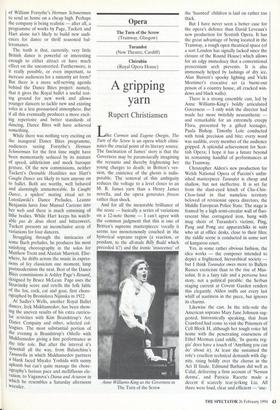Dance
Dance Bites (Leicester and touring)
False teeth
Sophie Constanti
The Royal Ballet's economy-sized, mis- leadingly titled new touring venture — Dance Bites — is both a revised system of selling the company away from home and a rather cynical attempt to develop new audi- ences for ballet. Having decided to cease touring large-scale works from the Covent Garden repertoire — because this confined the company to the few theatres in Britain big enough to accommodate it — the Royal is now concentrating on more flexible pro- grammes of small-scale and mostly new ballets to replace the full-length classics. But are these two- and three-night stands of contemporary choreography in more intimate venues simply in keeping with cur- rent trends, or are they a reflection of the lightweight, transient and increasingly image-conscious character of the Royal? Even making allowances for teething prob- lems, Dance Bites has none of its implied gnash. More accurately described as Ballet Scratchings, it is one of those something- for-everyone collections designed to appeal to the salaried classes of Leicester, Cam- bridge, Blackpool (the three places visited on this initial tour) or anywhere else. However, the most irritating thing about Dance Bites is the cowardly and obvious manner in which it deflects from the unknown quantity of new ballets by in- house choreographers, Ashley Page, William Tuckett and Matthew Hart, using Ashton's Monotones II to pacify the audi- ence and relying on the crude stimulation
of William Forsythe's Herman Schmerman to send us home on a cheap high. Perhaps the company is being realistic — after all, a programme of works by Page, Tuckett and Hart alone isn't likely to build new audi- ences for dance or thrill seasoned bal- letomanes.
The truth is that, currently, very little British dance is powerful or interesting enough to either attract or have much effect on the unconverted. Furthermore, is it really possible, or even important, to increase audiences for a minority art form? But there is a more self-serving agenda behind the Dance Bites project: namely, that it gives the Royal ballet a useful test- ing ground for new work and allows younger dancers to tackle new and existing roles in a less pressurised atmosphere. But if all this eventually produces a more excit- ing repertoire and better standards of dancing, Dance Bites will have achieved something.
While there was nothing very exciting on the inaugural Dance Bites programme, audiences seeing Forsythe's Herman Schmennan for the first time might have been momentarily seduced by its mixture of speed, athleticism and mock baroque gesture. Of the new commissions, neither Tuckett's Desirable Hostilities nor Hart's Caught Dance are likely to turn anyone on to ballet. Both are worthy, well behaved and alarmingly unmemorable. In Caught Dance, a spiders' mating ritual set to Lutoslawski's Dance Preludes, Leanne Benjamin lures Jose Manuel Carreno into her web and there is much entwining of lithe bodies. While Hart keeps his watch- able pas de dewc short and bittersweet, Tuckett presents an inconclusive array of variations for four dancers.
Struggling through the intricacies of some Bach preludes, he produces his most satisfying choreography in the solos for Matthew Trent and Alastair Marriott. Else- where, he drifts across the music in expres- sions of fey classicism one moment, limp postmodernism the next. Best of the Dance Bites commissions is Ashley Page's Renard, designed by Bruce McLean. Page uses the Stravinsky score and retells the folk fable of the fox, cock, cat and goat, first chore- ographed by Bronislava Nijinska in 1922.
At Sadler's Wells, another Royal Ballet dancer, Irek Mukhamedov, has been show- ing the uneven results of his extra curricu- lar activities with Kim Brandstrup's Arc Dance Company and other, selected col- leagues. The most substantial portion of the evening is Brandstrup's Othello with Mukhamedov giving a fine performance in the title role. But after the interval it's downhill all the way, from Balanchine's Tarantella in which Mukhamedov partners a blank faced Miyako Yoshida with sunny aplomb but can't quite manage the chore- ography's furious pace and mellifluous ele- vation, to Vaganova's Diana and Actaeon in Which he resembles a Saturday afternoon wrestler.



























































 Previous page
Previous page